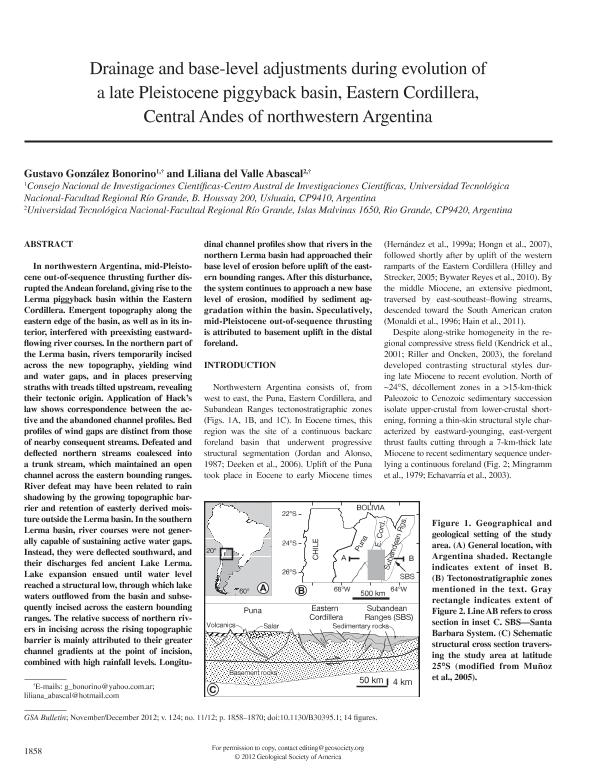Mostrar el registro sencillo del ítem
dc.contributor.author
Gonzalez Bonorino, Gustavo

dc.contributor.author
Abascal, Liliana del Valle

dc.date.available
2020-01-16T20:38:18Z
dc.date.issued
2012-12
dc.identifier.citation
Gonzalez Bonorino, Gustavo; Abascal, Liliana del Valle; Drainage and base-level adjustments during evolution of a late Pleistocene piggyback basin, Eastern Cordillera, central andes of northwestern Argentina; Geological Society of America; Geological Society of America Bulletin; 124; 11-12; 12-2012; 1858-1870
dc.identifier.issn
0016-7606
dc.identifier.uri
http://hdl.handle.net/11336/94994
dc.description.abstract
In northwestern Argentina, mid-Pleistocene out-of-sequence thrusting further disrupted the Andean foreland, giving rise to the Lerma piggyback basin within the Eastern Cordillera. Emergent topography along the eastern edge of the basin, as well as in its interior, interfered with preexisting eastwardflowing river courses. In the northern part of the Lerma basin, rivers temporarily incised across the new topography, yielding wind and water gaps, and in places preserving straths with treads tilted upstream, revealing their tectonic origin. Application of Hack's law shows correspondence between the active and the abandoned channel profiles. Bed profiles of wind gaps are distinct from those of nearby consequent streams. Defeated and deflected northern streams coalesced into a trunk stream, which maintained an open channel across the eastern bounding ranges. River defeat may have been related to rain shadowing by the growing topographic barrier and retention of easterly derived moisture outside the Lerma basin. In the southern Lerma basin, river courses were not generally capable of sustaining active water gaps. Instead, they were deflected southward, and their discharges fed ancient Lake Lerma. Lake expansion ensued until water level reached a structural low, through which lake waters outflowed from the basin and subsequently incised across the eastern bounding ranges. The relative success of northern rivers in incising across the rising topographic barrier is mainly attributed to their greater channel gradients at the point of incision, combined with high rainfall levels. Longitudinal channel profiles show that rivers in the northern Lerma basin had approached their base level of erosion before uplift of the eastern bounding ranges. After this disturbance, the system continues to approach a new base level of erosion, modified by sediment aggradation within the basin. Speculatively, mid-Pleistocene out-of-sequence thrusting is attributed to basement uplift in the distal foreland.
dc.format
application/pdf
dc.language.iso
eng
dc.publisher
Geological Society of America

dc.rights
info:eu-repo/semantics/openAccess
dc.rights.uri
https://creativecommons.org/licenses/by-nc-sa/2.5/ar/
dc.subject
ARGENTINA
dc.subject
GEOMORFOLOGIA
dc.subject
ANDES
dc.subject
FLUVIAL
dc.subject.classification
Geología

dc.subject.classification
Ciencias de la Tierra y relacionadas con el Medio Ambiente

dc.subject.classification
CIENCIAS NATURALES Y EXACTAS

dc.title
Drainage and base-level adjustments during evolution of a late Pleistocene piggyback basin, Eastern Cordillera, central andes of northwestern Argentina
dc.type
info:eu-repo/semantics/article
dc.type
info:ar-repo/semantics/artículo
dc.type
info:eu-repo/semantics/publishedVersion
dc.date.updated
2020-01-15T19:21:58Z
dc.journal.volume
124
dc.journal.number
11-12
dc.journal.pagination
1858-1870
dc.journal.pais
Estados Unidos

dc.journal.ciudad
Boulder
dc.description.fil
Fil: Gonzalez Bonorino, Gustavo. Consejo Nacional de Investigaciones Científicas y Técnicas. Centro Austral de Investigaciones Científicas; Argentina. Universidad Tecnológica Nacional. Facultad Regional Río Grande; Argentina
dc.description.fil
Fil: Abascal, Liliana del Valle. Universidad Tecnológica Nacional. Facultad Regional Río Grande; Argentina. Consejo Nacional de Investigaciones Científicas y Técnicas; Argentina
dc.journal.title
Geological Society of America Bulletin

dc.relation.alternativeid
info:eu-repo/semantics/altIdentifier/doi/https://doi.org/10.1130/B30395.1
dc.relation.alternativeid
info:eu-repo/semantics/altIdentifier/url/https://pubs.geoscienceworld.org/gsa/gsabulletin/article/124/11-12/1858/125791/Drainage-and-base-level-adjustments-during
Archivos asociados
